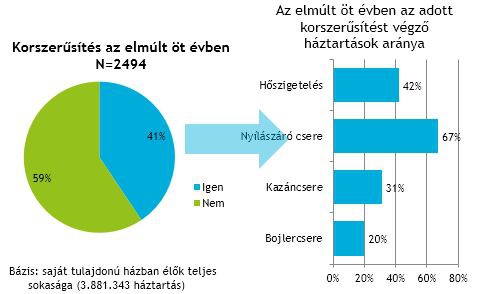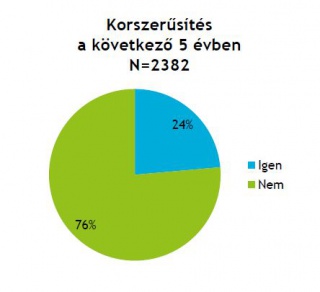41% of Hungarians have made energy efficiency investments in the past 5 years and a quarter of them plan to do so in the next 5 years, according to a survey conducted by the Hungarian Energy Efficiency Institute in autumn 2016. Improving energy efficiency is the most important issue for people living in a rural family house, but attitudes of renovators differ on energy efficiency products.
The research aimed to assess the market for residential energy efficiency products and to map consumer attitudes. The survey looked at residential investments over the past five years and investment plans for the near future. The analysis also provided an estimate of the size of the market for the main elements of residential energy efficiency retrofit in Hungary and the level of investment intentions over the next 5 years.
Modernisations of the past and plans for the future
41% of homeowners have made some kind of energy efficiency retrofit in the last five years. The most popular investment was window replacement (67%), followed by insulation (42%), boiler (31%) and water heater (20%) replacement. Investments were found to be independent of dwelling type, region and municipality type, but correlated with the level of household savings. The better off a household is financially, the more likely they are to have carried out some energy modernisation in the last five years.

24% of households surveyed would like to make some kind of energy-saving renovation to the house they live in in the next five years. Owners of detached houses living in rural areas are more likely than average to plan some kind of retrofit in the next five years.

The market for building energy efficiency products
The survey also provided a comprehensive estimate of the size of the residential market for the main building energy efficiency products (insulation materials, boilers, windows, water heaters). The market for energy efficiency is estimated to be in the order of EUR 1200 billion over the next five years. Although the level of residential investment in the near future is lower (24%) than in the past (41%), 920,000 households are still planning to upgrade their homes over the next five years.
Energy efficiency attitudes by product group
The motivation of households to undertake interventions to increase energy efficiency varies by type of investment. While for thermal insulation, the leading reason is clearly to reduce energy waste, for windows, boilers and boilers energy efficiency is not the most important decision criterion.
Alarming trends
The research strongly confirmed a negative trend that has already been highlighted by the State Secretariat for the Environment: the renaissance of highly polluting mixed fuel combustion in Hungary. In the last 5 years, 22% of newly purchased household boilers were mixed-fired.
In Hungary, 8-14 thousand people die prematurely as a result of air pollution. Domestic heating is the biggest contributor to bad air, accounting for 70 percent of all cases.
There is also a tendency to wait before investing in energy efficiency, especially for mechanical products, until something becomes old or completely obsolete.
Methodology of research
Telephone interviews were conducted to explore the potential of energy-aware investments in the population. Data collection took place in the first half of October 2016, with a total of 2507 interviews recorded. The sample is regionally, by type of settlement and household size, nationally representative, reflecting the views of 3.88 million households that own their property.
Thanks are due to the MEHI’s professional partners Ariston Thermo Kft, Bachl Hőszigetelőanyag-gyártó Kft, Baumit Kft, Daikin Hungary Kft, HAJDU Hajdúsági Ipari Zrt, Lasselsberger-Knauf Kft. for their participation in the research and the compilation of the questionnaire. Ltd, Murexin Kft, Saint-Gobein Construction Products Hungary Kft, Vaillant Saunier Duval Kft, Weishaupt Hőtechnika Kft and the experts of Energiaklub.

